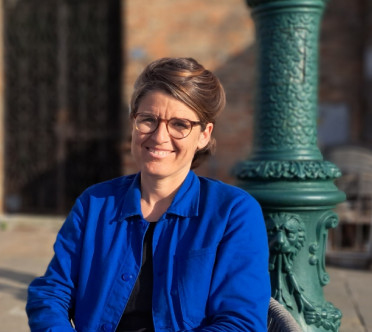Anne Lambert
An interview with Anne Lambert, in charge of INED’s Doctoral and Post-doctoral Affairs (Délégation des Affaires Doctorales et Post-doctorales) since the 1st of the year.
(Interview conducted in January 2024)
What does being in charge of Doctoral and Post-doctoral Affairs at INED entail?
Every year INED hosts nearly 50 PhD students and around 20 post-doctoral fellows from a wide range of disciplines and institutions and with varying academic histories. A challenging undertaking! The mission of the Délégation is to support and accompany these young researchers during their training programs and moves toward a professional career. Doing so requires dealing with the collective questions and issues involved while closely following individual situations and working to meet any specific needs expressed. The Délégation is well equipped to do this, as we work closely with all of INED’s research units and research support services as well as with our partners at Campus Condorcet and throughout the academic sphere.
During my term, I intend to work on several priority issues, some of which my predecessor Emilie Counil already got started on. These include improving students’ knowledge of their rights and duties and of the administrative procedures required by France’s labor code and General Data Protection Regulation (RGDP); working to develop their academic and scientific writing skills; integrating AI tools into data collection and processing; and facilitating and organizing exchanges on professional opportunities in research and teaching and in research-related professions in France and internationally.
I will also be pursuing efforts to integrate young researchers into the scientific life of our institution, and working with the relevant PhD programs and partner institutions to ensure the relevance and fit of their training at INED.
Lastly, this year and next, INED is hosting the European Doctoral School of Demography (EDSD), an international PhD student training program funded by five European research centers and 12 European universities. I will be working with the steering committee to bolster synergies around access to courses, workshops, and trainings, while facilitating intellectual exchange and collaborative work among young researchers. Having the EDSD here is a great opportunity for all of them—and for INED!
What are your specific missions as head of the Délégation?
As a public research institute, INED’s main missions are to study all aspects of population and to train aspiring researchers in research by giving them an opportunity to practice research. In the last few years, it has been INED’s policy to offer the finest conditions to the doctoral students it hosts so as to enable them to complete their PhDs successfully, publish articles and generally gain recognition for their thesis work, and further develop their skills and professional networks. It’s a three-pillar policy: hosting students materially; providing them with scientific support in their thesis work; and assisting them in starting or furthering their careers.
As head of the Délégation aux Affaires Doctorales et Post-Doctorales, I will therefore be steering this hosting policy and working to develop it further, in conjunction with the INED directorate, PhD and post-doc representatives, and our institutional partners (graduate schools and universities). The aim is to take account of changes in the institutional environment of higher learning and research while responding to the challenge of career trajectory internationalization and the comments and needs expressed by our young researchers themselves.
The academic year at INED is punctuated by strong collective moments such as the day new PhD and post-doc students are welcomed to the Institute and a spring “doctoral student day.” Meanwhile, PhD students and post-doc fellows have their own seminars and access to all INED seminars, study days, and conferences. They can also use our research support services, and are eligible for international mobility assistance. They are free to discuss their work with any and all INED researchers throughout their time at INED—an excellent means to discover the wide range of interdisciplinary studies conducted at our Institute and the multitude of methods used in them. These opportunities considerably enrich their training.
For the last three years, the Délégation has been conducting a survey on INED-hosted doctoral student and post-doctoral fellow outcomes, thereby keeping track of their trajectories once they leave INED. The survey is a precious steering instrument as we use it to assess our strengths and adjust our training and assistance arrangements accordingly.
Lastly, the Délégation aux Affaires Doctorales et Post-doctorales is in charge of providing temporary work contracts to doctoral and post-doctoral researchers hosted at INED and to permanent researchers from other administrations or institutions on leave at INED, in conjunction with the relevant authorities and our iPOPs (“Individuals, Populations, Societies” Laboratory of Excellence) partners.

